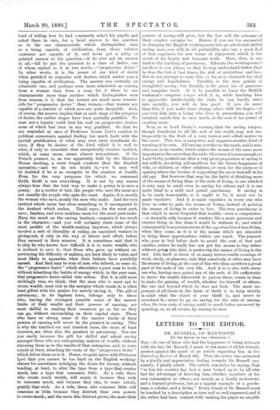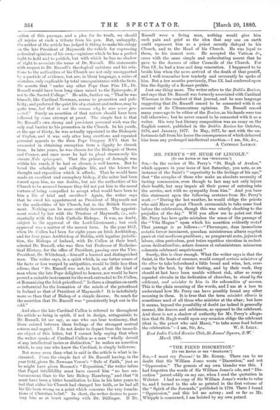LETTERS TO THE EDITOR.
DR. RUSSELL, OF MA.YNOOTH.
[TO THE EDITOR OF THE "SPECTATOR."]
S1R,—As one of those who had the happiness of being intimate with the late Dr. Russell, I must, in the name of all his friend, protest against the spirit of an article regarding him in the Saturday Review of March 6th. That the writer was animated by a kindly and appreciative feeling towards Dr. Russell per- sonally, I gladly admit. The article concludes by saying, that "in him his country has lost a man looked up to by all who had the advantage of knowing him, whether members of his own communion or others, not merely as a kindly ecclesiaetic and a learned professor, but as a typical example of a gentle- man, a scholar, and a divine." Every friend of Dr. Russell must be touched by a description so true and, so well expressed, and if the writer had been content with making his paper an aniplifi- cation of this passage, and a plea for its truth, we should all rejoice at such a tribute from his pen. But, unhappily, the author of the article has judged it fitting to make his eulogy on the late President of Maynooth the vehicle for expressing polemical opinions of his own,—opinions which he has a perfect right to hold and to publish, but with which he has no shadow of right to associate the name of Dr. Russell. His statements with respect to Dr. Russell's theological opinions and his rela- tions to the authorities of his Church are not only unsupported by a particle of evidence, but are, in blunt language, a series of mistakes, only explicable by total unacquaintance with the facts. He asserts that "under any other Pope than Pius IX., Dr. Russell would have been long since raised to the Episcopate, if not to the Sacred College." He adds, further on, "That he was himself, like Cardinal Newman, averse to promotion and pub- licity, and preferred the quiet life of a student and recluse, may be quite true, but that is not the reason why he was never pro- moted." Surely an assertion of that nature should have been followed by some attempt at proof. The simple fact is that Dr. Russell's own strong and persistent personal wish was the only real barrier to his promotion in the Church. in his youth, at the age of thirty, he was actually appointed to the Bishopric of Ceylon, and it was only after long exertions and repeated personal appeals to the then Pope Gregory XVI. that he succeeded in obtaining exemption from a dignity he shrank from. In later years, he was chosen for the Bishopric of Down and Connor, and once more he had to plead strenuously his sincere Nolo episcopari. That the primacy of Armagh was within his reach, if he had so chosen, is well known. But he loved the scholarly and collegiate life, and the leisure for thought and exposition which it affords. That he would have made an excellent and exemplary bishop, if the mitre had been forced upon him, no one doubts, but are the authorities of his Church to be accused because they (lid not put him to the moral torture of being compelled to accept what would have been to him a life of trial and sacrifice ? Again, the writer says that he owed his appointment as President of Maynooth not to the authorities of his Church, but to the British Govern- ment. Nothing can be more entirely incorrect. The appoint- ment rested by law with the Trustees of Maynooth, i.e., sub- stantially with the Irish Catholic Bishops. It was, no doubt, subject to the approval of the Lord-Lieutenant ; but such approval was a matter of the merest form. In the year 1857, when Dr. Cullen had been for eight years an Irish Archbishop, and for four years Archbishop of Dublin, with legatine jurisdic- tion, the Bishops of Ireland, with Dr. Cullen at their head, selected Dr. Russell, who was then but Professor of Ecclesias- tical History, for the office of President, passing over the Vice- President, Dr. Whitehead,—himself a learned and distinguished man. The writer says, in a spirit which, in one better aware of the facts or less warped by antipathies, would be little less than odious, that "Dr. Russell was not, in fact, at all the kind of man whom the late Pope delighted to honour, nor would he have proved a suitable instrument for the work entrusted to Dr. Cullen, of Romanising the Irish priesthood." Is there a situation on earth so influential for the formation of the minds of the priesthood in Ireland as that of President of Maynooth ? It is indefinitely more so than that of Bishop of a simple diocese. So much for the assertion that Dr. Russell was "persistently kept out in the cold."
And since the late Cardinal Cullen is referred to throughout the article as being in spirit, if not in design, antagonistic to Dr. Russell, let me say, as one who can bear testimony, that there existed between them feelings of the strongest mutual esteem and regard. r do not desire to depart from the immedi- ate object of this letter, but I cannot help saying that when the writer speaks of Cardinal Cullen as a man "wholly devoid of any intellectual tastes or distinction," he makes an assertion which, to any one who knew the Cardinal, is simply ludicrous.
But worse even than what is said in the article is what is in- sinuated. From the simple fact of Dr. Russell having, in the year 1842, given Dr. Newman Veron's "Rule of Faith," just as he might have given Bossuet's "Exposition," the writer infers that Papal infallibility must have caused him "no less em- barrassment than to the late Bishop Haneberg," and that "it must have been a bitter humiliation to him in his later years to feel that either his Church had changed her faith, or he had all his life been wrong on a point which concerns the very founda- tions of Christian belief." In short, the writer desires to pour- tray him as at heart agreeing with Dr. Dollinger. If Dr.
Russell were a living man, nothing would give him such pain and grief as the idea that any one on earth could represent him as a priest secretly disloyal to his Church, and to the Head of his Church. He was loyal to them, to his inmost core. He accepted the Vatican c1,-_ crees with the same simple and unhesitating assent that he gave to the decrees of other Councils of the Church. For Pius IX. he had a true and deep veneration. I happened to be beside him when the news arrived of the death of that pontiff, and I well remember how tenderly and reverently he spoke of him. But a few months previously, Pius IX. had conferred upon him the dignity of a Roman prelate.
Just one thing more. The writer refers to the Dublin Review, and says that Dr. Russell was formerly associated with Cardinal Wiseman in the conduct of that journal, and he uses language suggesting that Dr. Russell ceased to be connected with it on account of its Ultramontane opinions. Dr. Russell ceased many years ago to be editor of the Review, as his hands were too full otherwise; but he never ceased to be connected with it as a writer. His very last literary composition was an essay on the English sonnet, published in the Dublin _Review for October, 1876, and January, 1877. In May, 1877, he met with the un- fortunate fall from his horse the consequences of which debarred him from any prolonged intellectual exertion.—I am, Sir, &c.,
A CATHOLIC LAYMAN.



































 Previous page
Previous page